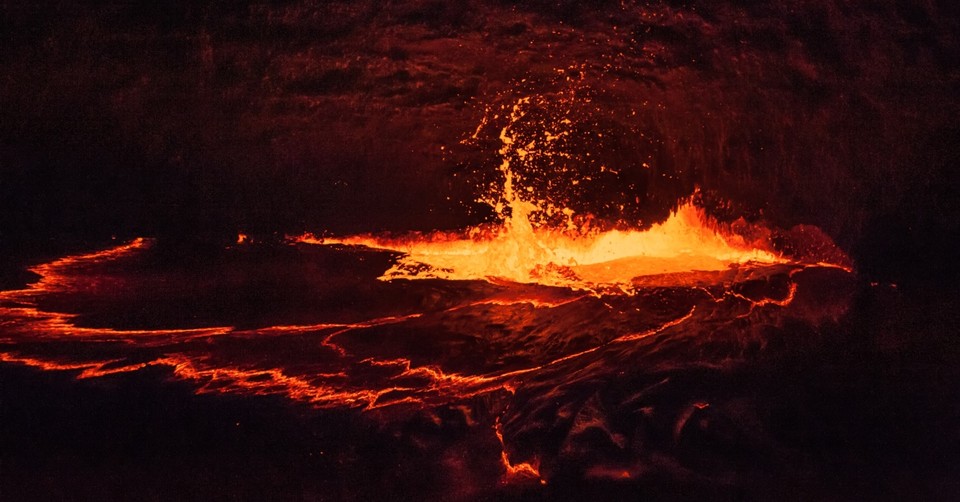In 2014, a Pew Research Center poll found that twenty-nine percent of Catholics, eleven percent of Evangelical protestants, and 40 percent of mainline Protestants said they didn’t believe in the existence of hell.
Considering the Bible makes mention of hell on several occasions, and because hell exists as a place where unrepentant sinners who did not have a saving relationship with Jesus go, it seems like there’s a weird cognitive dissonance in the Christian church, particularly, the Christian American church.
We could speculate as to the number of reasons why a person would choose not to believe in hell. For instance, a person who ascribes to the prosperity feel-good “Gospel” may not like any of the negative passages of Scripture that involve judgment, sin, and of course, hell. Others may have known a loved one who passed, and they did not know if that person had a saving relationship with Jesus. They may find comfort in thinking that hell does not exist, when in reality, it very much does.
In this article, we’ll explore the nature of hell, what it looks like, what Scripture has to say about this place, and why we should know about hell as Christians.
Photo credit: ©Getty Images/Brina Bunt

Is Hell Real?
Is hell real? Short answer: yes. As stated above, yes. We know this for a number of reasons. First, Scripture confirms this, and Jesus preaches on hell several times in his parables and sermons. We’ll dive into specific verses in a moment, but we also have other reasons to believe in the existence of hell.
First, let’s define our terms. Hell is the eternal separation from God due to a sinful and unrepentant life on earth. In other words, God doesn’t send people to hell. People march into it.
We also will uncover, later, who goes to hell and why hell is even necessary in the first place.
There are, of course, scattered theories in Christian circles about how long punishment lasts in hell. Some people believe hell is a purgatory of sorts that cleanses people of their sins before they go to heaven. Others align with annihilationism, in which after a time, souls in hell perish into nonexistence. And others believe that those who experience punishment in hell experience torment for all eternity.
No matter what a person’s viewpoint is, we cannot deny the real existence of hell. Deleting it from Christian doctrine cheapens the cross, the resurrection, and Christianity itself.
What Does Hell Look Like?
This really depends on who you ask. Scripture does often use torture and fire imagery, but we also know from the entire book of Revelation and second half of Daniel that sometimes Scripture can use metaphor. Just look at how Ezekiel attempts to describe angels.
Authors from Dante Alighieri to C.S. Lewis have ranged in how they’ve described hell, from literal to speculative.
As far as the location for hell goes, people have proposed various theories. One of these is that it exists within the earth’s core, while others believe it exists somewhere in outer space. However, pinpointing the exact location of Hell is difficult, if not impossible.
In Jesus’ parable of Lazarus and the rich man (Luke 16), it appears that those in hell have the ability to see heaven, but that a great chasm divides the two, so neither can pass from one into the other.
In either case, we can speculate all we like about the location and nature of the possibly fiery and brimstone place, but what we should takeaway is that it is not a desirable place to end up.
Photo credit: Pexels/Oladimeji Ajegbile

Are There Any Verses Specifically about Hell?
Before we dive into this, we need to make note that Scripture often plays with three terms Gehenna, Sheol, and Hades. Let’s quickly define these:
Gehenna: A valley used in the past for child sacrifice, often equated to the eternal flaming punishment of hell.
Sheol: Grave or dwelling place of the dead, often used in the Old Testament. Doesn’t necessarily mean hell, but it can.
Hades: The Greek word for hell, used throughout the New Testament
With that in mind, let’s explore what Scripture has to say about hell.
“But as for the cowardly, the faithless, the detestable, as for murderers, the sexually immoral, sorcerers, idolaters, and all liars, their portion will be in the lake that burns with fire and sulfur, which is the second death” (Revelation 21:8).
At the end of time, those who lived in hell will experience the eternal punishment of something known as the lake of fire. Depending if you believe in annihilationism or not, you may believe that those who go into the lake of fire will cease to exist.
“And do not fear those who kill the body but cannot kill the soul. Rather fear him who can destroy both soul and body in hell” (Matthew 10:28).
“Then he will say to those on his left, ‘Depart from me, you cursed, into the eternal fire prepared for the devil and his angels’” (Matthew 25:41).
“Just as Sodom and Gomorrah and the surrounding cities, which likewise indulged in sexual immorality and pursued unnatural desire, serve as an example by undergoing a punishment of eternal fire” (Jude 1:7).
“And if your hand causes you to sin, cut it off. It is better for you to enter life crippled than with two hands to go to hell, to the unquenchable fire” (Mark 9:43).
We could go on and on. Scripture has a lot to say about hell. Mainly, it is not a pleasant place, and we do not want to end up in such a place when we reach the end of our days on earth.
Photo credit: ©Getty Images/slavasam777

Who Goes to Hell?
Anyone who does not have a saving relationship with Jesus goes to hell. We can’t say “Well Christians go to heaven, and non-Christians go to hell,” because we cannot personally know what is in a person’s heart. We know many “Christians” who are goats disguised as sheep.
The Bible makes it clear – we need to have a personal, saving relationship with Jesus (we need to have experienced his salvation on earth) in order to go to heaven.
But wait, we may say, doesn’t hell seem like overkill? After all, wouldn’t people tire after thousands of years of watching even the most evil of men, such as Nero or Hitler, suffer eternal punishment?
Of course, an article of this size cannot nearly capture the scope to answer that question. In some ways from our perspective, hell seems unfair. Why would good people by our standards ever endure such punishment?
First, we need to establish, as mentioned above that someone who goes into hell marches into it. We choose to go to hell; God does not send us there. His holiness would annihilate us on the spot if we approached heaven with unrepentant hearts. Only because the Holy Spirit lives within us can we boldly approach his throne.
Secondly, the Great Divorce by C.S. Lewis and the Parable of the Rich Man suggest that people in hell would rather hate heaven. In fact, these suggest that they may commit more sins in hell, accumulating the sin debt, and prolonging one’s punishment for all of eternity.
Allow me to explain. In the Great Divorce, a work of fiction by C.S. Lewis, people from hell get a chance to visit heaven. And they hate it. They want to go back to hell.
In the parable of the rich man, the rich man begs Abraham to let him go warn his family about the dangers of hell. Abraham says, “If they won’t listen to Moses and the prophets, they won’t be persuaded even if someone rises from the dead.”
In other words, Abraham tells him, “Look, they have Scripture. If they don’t listen to that and believe (even after Jesus literally rose from the dead), you can’t unharden a heart.”
Finally, we need to understand the gravity of sin. As Christians, we don’t take sin seriously enough. Sin is far more than a slap to God’s face. It is rebellion. It is betrayal. It is claiming that God does not deserve to be on the throne, but in fact, we do.
Sin destroys, deteriorates us beyond recognition, and causes a “good person” to commit terrible atrocities. The more we understand sin, the more we can understand the length of punishment in hell, especially if in hell, sinners keep sinning.
Photo credit: ©Getty Images/Dmytro Varavin

Why Should We as Christians Be Aware of Hell?
If you have a saving relationship with Jesus, you need not be afraid of hell. But it certainly does spur us out of our slumber to have as many conversations with nonbelievers as possible.
With that being said, please do not give any “turn or burn” sermons. I cannot tell you the amount of damage Christians have caused by telling people to turn to Christianity simply to avoid hell. Perfect love casts away fear, and we should not start a relationship with perfect love (Jesus) by fearing death.
We can discuss the nature of hell and the need for Jesus, but we also cannot make that the only subject upon which we preach. If we preach only fire and brimstone, we will turn others quickly away from the church.
The Hope of New Life
Hell is very real.
No matter whether we believe in a literal fire and brimstone place or a place with torment of some kind, we know that humans choose the pathway to hell. God does not send them there.
Fortunately, we have a God who came to earth, died, and resurrected, so that we may have new life. Even when we tell others about hell, we can tell them about the hope of salvation and eternity that we have within us.
Is hell real? Absolutely. But so is God and his beautiful plan of salvation for us.
Related: Heaven - What is it Like and Where is it?
How Do I Get to Heaven?
Do Babies Go to Heaven When They Die?
Do Dogs go to Heaven?
Is Hell Real?
Are There Levels of Hell?
Photo credit: Pixabay/Creative Commons
Originally published October 20, 2020.







